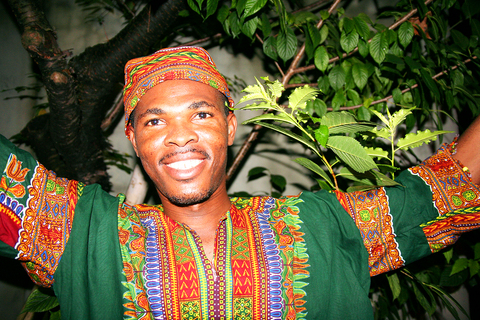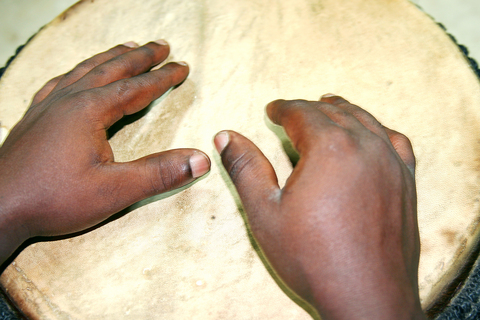It can be tough being black in Taiwan but Pan Africana Cultural Troupe aims to change that through the power of music.
The group has been banging the drum of African culture for four years, gigging at festivals, clubs, pubs, business functions and schools.
The seven band members play traditional African drums and songs, perform dances and acrobatics, as well as updating traditional music with rap, soca, reggae and dance hall sounds.

PHOTOS: JULES QUARTLY, TAIPEI TIMES
Tonight Pan Africana brings its message to Bliss, in Taipei. It's a message worth listening to.
“On the MRT or bus sometimes people don't want to sit by us, or hold their nose,” group founder Ben Stobite Sampson said. “It's difficult for people to get to know us because of what they've read or seen on the TV.”
“It's natural for people to be reserved to begin with, but after they listen to us and know us they will love us and we will come together as one.

“Chinese culture is traditional and strong so it can be hard to change people's minds. But generally, we have found Taiwanese to be kind and once they know who we are they are very friendly.”
Often enough, Sampson said, Westerners are the first to appreciate their music and dance. “They show the way and when locals see this they think it's OK and get involved themselves.”
Sampson is a thoughtful and enterprising man from Ghana, who saw the need for cultural understanding on his travels around Asia as an import-export businessman.
It was in Guangzhou (廣州), China, that the 33-year-old saw an African troupe entertaining a crowd and thought, “I want to do this too.” But he decided to do it in Taiwan, which he had visited and liked.
He returned to Ghana in 2002 and completed a course in cultural studies, then bought some drums and costumes and returned to Taipei.
“Luckily I met Kim [Douglas] and we thought we could do something, a collaboration, and it's all worked out since then.”
For the past two years they have been building up a reputation as entertainers and cultural ambassadors. Last month the government finally approved Sampson's application to run his business here.
With a visa and residency the aim is to consolidate Pan Africana as a community organization in Taiwan and eventually spread the message to other parts of Asia.
As well as performing, Sampson and his group teaches African dance and drumming, participates in conventions and work shops, and exhibits clothing and crafts from the continent.
“A lot of people have presumptions about black people, many of them false. So music builds a bridge between us,” Douglas said.
The political science student has lived in Taiwan for four years, speaks good Chinese and has a fair understanding of his adopted home. He comes from Dominica, a small country in the Caribbean, where his father was prime minister.
“The Chinese [Taiwanese] like a fairy tale, there's a lot of stereotypes about Africa and Africans, so we're trying to reverse that and put out a more positive image. You know, black is beautiful.”
Cobby Hoffman, from Ghana, said it's sometimes difficult being black in Taiwan because of the reaction of people to his skin color.
“But I really like being black. It can be a disadvantage but I wouldn't change it, it's part of my ancestry. There is ignorance but not necessarily discrimination.”
As for the music, Douglas said, “It's an international trend to equate black people with mainstream culture in America like rap music. But our roots are in Africa and this is the music we promote.”
“We just want to introduce African music to Taiwan. It's never been done. When I first came here I was like a social butterfly, but I wasn't happy with the scene, socializing and hip hop. I got put off by all that,” Douglas said.
“The drum transcends everything, it's real culture from a black man's perspective, not just spinning records.”
Group members play a range of instruments, including the djambe, doundoun, sousaphone, finger cymbal, maracas, tonton-sansan, castanets and talking drums.
They wear traditional African costumes when they play because it adds to the authenticity.
“We get a lot of people, mostly women, coming up to us after shows asking where they can buy our clothes. The fact is they are very colorful and beautiful. We're going to start importing them,” Sampson said.
Most performances are in two parts: The first section is dedicated to traditional rhythms such as adowa, kpanlogo and mapuka. A second segment moves the tempo up a notch to hi-life, reggae, dance hall, soca, calypso and even rap — when Douglas transforms himself into DJ Rankin Kim.
According to Douglas, a majority of modern popular music is “rooted in the African drum” and even dance hall is just “a watered down African beat.”
Though the group has members from the Caribbean, Cameroon and elsewhere, it sees itself as representing Africa as a whole, hence its name.
“We started up with the traditional beats and we're now becoming more versatile as a band,” Douglas said. He has even written a song recently with Mandarin lyrics.
“We have formed a fan base outside of Taipei because of our shows,” Sampson said. “The idea is to keep building and develop the brand.”
On the way they will change hearts and minds, as surely as the drum has a beat.
For your information:
Pan Africana performs at Bliss tonight, from 10pm. Entrance is NT$300 and includes a drink. Bliss is at 148 Xinyi Rd Sec 4, Taipei (台北市信義路四段148號).
For further information about Pan Africana Cultural Troupe and future gigs visit www.panafricana.blogspot.com or contact the group by sending an e-mail to panafricana@buffalo.com.

The 2018 nine-in-one local elections were a wild ride that no one saw coming. Entering that year, the Chinese Nationalist Party (KMT) was demoralized and in disarray — and fearing an existential crisis. By the end of the year, the party was riding high and swept most of the country in a landslide, including toppling the Democratic Progressive Party (DPP) in their Kaohsiung stronghold. Could something like that happen again on the DPP side in this year’s nine-in-one elections? The short answer is not exactly; the conditions were very specific. However, it does illustrate how swiftly every assumption early in an

Towering high above Taiwan’s capital city at 508 meters, Taipei 101 dominates the skyline. The earthquake-proof skyscraper of steel and glass has captured the imagination of professional rock climber Alex Honnold for more than a decade. Tomorrow morning, he will climb it in his signature free solo style — without ropes or protective equipment. And Netflix will broadcast it — live. The event’s announcement has drawn both excitement and trepidation, as well as some concerns over the ethical implications of attempting such a high-risk endeavor on live broadcast. Many have questioned Honnold’s desire to continues his free-solo climbs now that he’s a

Francis William White, an Englishman who late in the 1860s served as Commissioner of the Imperial Customs Service in Tainan, published the tale of a jaunt he took one winter in 1868: A visit to the interior of south Formosa (1870). White’s journey took him into the mountains, where he mused on the difficult terrain and the ease with which his little group could be ambushed in the crags and dense vegetation. At one point he stays at the house of a local near a stream on the border of indigenous territory: “Their matchlocks, which were kept in excellent order,

Jan. 19 to Jan. 25 In 1933, an all-star team of musicians and lyricists began shaping a new sound. The person who brought them together was Chen Chun-yu (陳君玉), head of Columbia Records’ arts department. Tasked with creating Taiwanese “pop music,” they released hit after hit that year, with Chen contributing lyrics to several of the songs himself. Many figures from that group, including composer Teng Yu-hsien (鄧雨賢), vocalist Chun-chun (純純, Sun-sun in Taiwanese) and lyricist Lee Lin-chiu (李臨秋) remain well-known today, particularly for the famous classic Longing for the Spring Breeze (望春風). Chen, however, is not a name